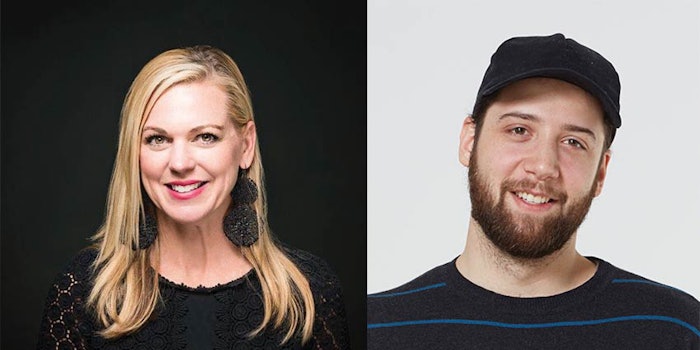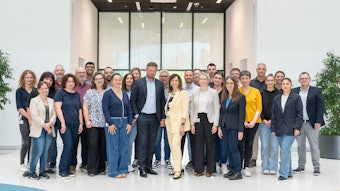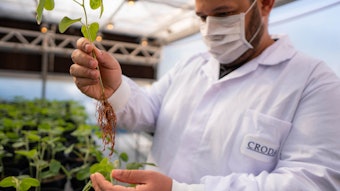
A version of this interview appears in the September 2020 issue of Global Cosmetic Industry as part of the "Luxury Beauty 2020" feature. -Editor
How does one of the biggest beauty companies shift its practices and mindset during a fast-moving crisis? In this exclusive interview, Tulie White, vice president, global learning and development, The Estée Lauder Companies, and Alex Levin, co-founder of L+R*, discuss how technology and new strategies kept an industry giant nimble.
Global Cosmetic Industry: How would you describe the integration of technology into the luxury experience prior to the pandemic?
Levin: Pre-COVID-19, digital technology applied to the luxury experience was primarily used as a conduit for transactions, including (but not limited to) product/collection/collaboration announcements, advertising, marketing, messaging, and commerce.
The primary application of technology was a form of communication, whether it be a website, social media profile, or digital content. The luxury sector has often resisted true digital technological integration, investing more often in common enterprise systems, such as Customer Relationship Management (CRM) systems, used to programmatically organize their customers’ interaction with the company and maintain multi-channel communication.
For the most part, the systems have been installed, but are leveraged and relied upon sparingly, so as not to interrupt the humanity of the luxury experience. Furthermore, digital technologies that offer luxury experiences generally act as digital-to-physical touchpoint, making it easier and more convenient to purchase, personalize, or learn more about products and services.
Global Cosmetic Industry: What technology needs have emerged as a result of COVID-19's impacts?
Levin: Digitally-enabled experiences and service offerings, centralized platforms, and digital content, were needed prior to COVID-19, but many companies struggled to justify investments in digitization. In 2020, the landscape and ways of doing business have drastically changed, for both customer-facing and company-facing needs.
For retail, sophisticated digital appointment booking platforms are allowing customers to schedule times for them to shop, lessen wait times, and receive focused attention from sale representatives.
This is severely reducing foot traffic, since each customer is effectively registering for each store visit, but there is potential for activating a more connected personal experience between in-store and online and focusing efforts on more qualified leads. In the age of COVID-19, luxury is becoming a more dynamic environment, forced to create more of the awe-inspiring, “wow” moments.
Particularly for the largest firms, seamless communication, empowerment and activation of their global workforce and staff has also become an area of focus. The internal content must be personalized and relevant, allowing for remote employee growth and engagement. COVID-19’s impact on HR departments has amplified the importance of upskilling and advancing the workforce of the future by using efficient digital tools.
These essential business systems need to be tested, selected, and integrated by luxury brands. The investment is complicated. Companies must decide to "build vs. buy,” and after making this decision, ensure the systems are operated by trained staff, who understand the vision of the company, and are able to maximize value while ensuring elevated aesthetics are executed.
There is a strong need for next generation customer, employee, and content management platforms that can truly identify the needs of customers, as well as provide seamless flow of information and insights. What was often considered an add on is now becoming a key focus, and now, luxury companies need to quickly identify the right technology partners, platforms, and teams to ideate, deploy and evolve their businesses.
White: The pandemic has had an extraordinary impact on many industries, from the well-being of employees to the viability of business models pushing companies to pivot and refine short term plans, luxury beauty and its training efforts was no exception. As March evolved and COVID-19 spread beyond Asia, most of our offices and retail stores temporarily closed – causing a significant disruption in the Company’s traditional operating environment
With a majority of our employees working remotely, we had an opportunity to accelerate our blended learning strategy that is powered by technology and focus on content to support our employees in a time of crisis rethinking how we continue to deliver and even enhance our learning activities.
We quickly shifted our Learning & Development activities to a digital format.
While we always offered select digital learning opportunities, we had still depended heavily on in-person sessions so we had to quickly pivot to technologies that offered scale and advanced virtual teaching tools that could also provide a high-touch virtual interaction/engagement. We also enhanced and facilitated virtual learning initiatives to support more employees during COVID-19:
We have very entrepreneurial and agile learning teams, who have been doing an amazing job leveraging technology and pivoting to the new environment:
- Our brand teams are running live stream tutorials with customers,
- Our education teams have upskilled to deliver virtual seasonal schools using the latest teaching technologies, and
- Our supply chain teams are doing more training via augmented reality given new physical distancing requirements.
Global Cosmetic Industry: How can technology help companies and brands deliver personalized experiences?
Levin: Digital technology, silently driven by contextual and unobtrusive active and passive data collection, will continue to provide personalized digitally-enabled experiences well beyond that of what the physical world could provide alone.
With this data, brands can develop systems that would allow for anticipatory services, better products, and more sustainable business practices. Digital will redefine the physical world and product, including the creation of products based off what they know their desired customers want, the communication of a new product and service supporting customers past purchases or interests, to-the-minute updates on the status of an order, the mailing of a personalized letter to a customer congratulating them on personal life events, and much more.
Global Cosmetic Industry: How does it help brands connect with consumers and build affinity?
Brand affinity is built with the awe-inspiring, experiential moments of luxury across the omnichannel ecosystem, which can be attained with otherworldly artistic creative design, craftsmanship/engineering, premier experience, extreme personalization, and an innate understanding of the human condition.
Technology, when properly crafted, has an excellent "memory," enables infinite reach, and connectivity. To properly build affinity, it will require the individuals who build the digital technologies to deeply understand true luxury experiences and develop the systems accordingly.
Global Cosmetic Industry: What role does tech play in training staff for the new normal?
Levin: Technology, and more specifically connectivity, enables immediate distributed information, hyper-personalized learning pathways, and opportunities to learn new skills, allowing employees to be redeployed rapidly in a continuously changing environment. Tech also provides integrated systems for the education/trainings to exist that then allow for management to gain insights, identify opportunities, and iterate content to ensure efficacy and immediate applicability.
White: Many anticipate long-lasting changes to employee and customer behaviors and preferences. We see learning and technology to help us to adjust to these new norms. Even prior to COVID-19, we had embarked on a digital learning transformation, moving toward a true blended learning model combining traditional face-to-face training with online instruction.
As part of the transformational efforts, we created a large community of learning professionals across the enterprise to drive peer-to-peer learning (and be catalysts of learning in the flow of work) that is rooted in our company values fostering sharing, collaboration, experimentation to innovate faster as an organization while maintaining each brand, region, function, channel’s uniqueness.
While we were already headed in this direction, COVID-19 just accelerated our digital learning transformation. We saw learning engagement across the company increase and become new behaviors for our employees. Technology continues to unlock and expand our employee’s ability to stay connected and communicate across many pressing topics in real time with leadership, experts, and peers.
We also see social learning fueled by technology in our future, given recent increase engagement metrics.
The crisis simply accelerated our efforts and quickly became our largest “virtual learning pilot” to pressure test what works, what needs refinement, or what should be retired based on how our employees are interacting and engaging.
As a company that values face-to-face interaction, I think in-person training will always play an important role in our Learning & Development programs, however, digital is definitely here to stay and this experience has significantly reinforced its value.
We are continuously inventing and reinventing the future of beauty at our company. Our ability to anticipate the constantly evolving landscape and build capabilities to support our future is what sets us apart.
As we evolve in the Learning space, we plan to continue to be creative and pull levers that “bring our employees together to stay connected and learn together” leveraging the technology to reach our goals.
We anticipate our employees will have a higher expectation with regard to how they want to engage and learn in the future given their recent experiences.
Global Cosmetic Industry: How will the pandemic reshape luxury beauty in the coming years?
Levin: It is impossible to know for sure, but the transformational shift from the pandemic has forced us all to rethink our priorities. Luxury beauty represents personal expression, self-care, refinement, and how we choose to present ourselves to the world.
Over the past few months, with most people spending time at home, on video conference calls, wearing face masks, completely reliant on digital, the prioritization of getting out, safely socializing, returning to the ‘new normal’ and most importantly, appreciating what the world has to offer.
All of these activities mindfully include luxury beauty’s unique proposition to consumers. Thus, luxury beauty’s role continues with addressing the most relevant, new needs of the consumers, offering premium value, service, and experiences reshaped by the evolved landscape created by the pandemic.
Finally, what have you learned as you retooled your training organization to meet the unique challenges of 2020? What did you discover that you otherwise wouldn't have?
Recognizing the unique challenges of 2020 and beyond, we continue to focus on developing a learning culture that is rooted in advancing talent capability and digital craftsmanship, under the attentiveness of our Global Learning Center of Excellence, to push the company to the next level.
White: We recognized that with such a large and diverse employee population, we have an opportunity to continue to leverage and iterate our learning technology to enhance reach and maximize scale. At the same time, we knew it’s critical that we deliver High-Touch interactions in every experience we produce.
We are always looking to blend the physical and the digital to upskill our workforce, integrate and leverage our existing high-quality training programs, and deliver learning solutions with relevancy across our enterprise.
Accomplishing this seamlessly not only supports our global workforce, but also inspires employees in the same way we inspire our consumers with experiential learning opportunities. For employees, it pragmatically educates, builds deeper understanding of digital experiences, and thus empowers them to ideate and execute their unique luxury digital experience solutions. This ultimately fosters continuous business value across the company.
*L+R is a global design technology agency; The Estée Lauder Companies, Inc., and L+R, work together on digital design initiatives to enhance the employee experience.










